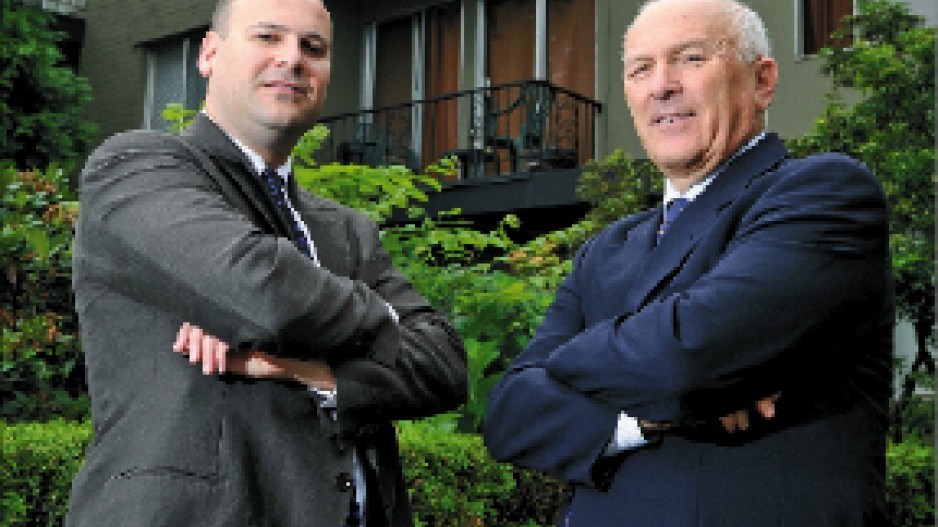David Goodman, considered among Vancouver’s top commercial real estate agents, admits he had reservations about inviting his then 24-year-old son Mark to join him in the business 10 years ago. On one hand, he needed “an in-office ally” in his exploding and competitive specialty: multi-family apartment buildings. On the other hand, he had doubts that a father-son team could work effectively together.
“There were ego issues I had to let go of,” he admitted.
Today, as principals in HQ Realty Ltd. of Vancouver, tracking to post $180 million in sales this year – up from $125 million in 2011 – the Goodmans have apparently formed a winning alliance.
“In a way, our positions have changed,” the elder Goodman said. “In some cases, I am the one being mentored.”
While the Goodmans see this as natural, it is a healthy sign of a family-business relationship, according to Francine Carlin, a principal with the family business consultant firm Business Harmonizer Group, which has offices in Vancouver and Victoria.
“In most cases, the father has to take off his dad hat, and the son has to take off his son hat and see each other as businesspeople,” she said. “It is best when the father is ready to let go of some leadership.”
David readily credits his son for dragging him into the Internet age – and the business opportunities that have come with it.
“Mark kept insisting I read Gonzo Marketing [the 2001 Christopher Locke bestseller paean to online sales], and when I finally did, I realized that he was right. I had to embrace this new technology.” It now backbones the team’s international sales effort.
Mark first began working with his dad at Macdonald Commercial Real Estate in Vancouver and, perhaps leaning on his psychology degree from UBC, spent a lot of time just listening.
“We would have the speakerphone on and I would hear how deals were made, how negotiations were done,” he said. But, as the apartment market boomed during the early 2000s, the young Goodman was soon in the thick of it.
Mark was no stranger to pressure. He was working on Howe Street when the tech bubble burst and then at the Jim Pattison Trading Group, where he traded internally with Pattison-owned entities around the world.
But the Metro Vancouver apartment market is an equally tough arena, and Mark realized the Goodmans – “We always considered ourselves a company within a company” – needed an edge. He found it by sharpening a marketing tool that his father started when he had started selling real estate as a rookie from Montreal in 1970.
Mark launched the Goodman Report – a real estate newsletter that his father had always packed with market commentary and reports on sales and listings – into the globosphere.
Today, with 50,000 subscribers, the free Goodman Report is read from Burnaby to Beijing. Last year, Mark spent weeks in China just visiting longtime subscribers. It is likely no coincidence that buyers from Mainland China now make up about one-third of all the apartment buildings the Goodmans sell.
The Goodmans now account for an estimated 70% of the apartment building sales in Metro Vancouver, yet they both seem genuinely amazed at how well they work together.
“When I come in [in] the morning, we talk about the grandkids, I may show dad some photos, but then it is right to work,” Mark said. They have separate offices divided by a sliding glass door, often open so “we can yell ideas at one another.”
Carlin noted that this differentiation is important so each family member can “still respect the boundaries” of a business relationship.
The Goodmans say they are equally amazed at how the apartment market has changed.
This February, David said he was “embarrassed” when a client insisted on listing a 60-year-old 14-unit Kitsilano apartment building at $464,286 per suite, unprecedented for a Vancouver walk-up.
“I convinced him he had to drop the price,” David said. “I mean, prices are becoming absurd.” Still, when the original offer hit the market, a half-dozen buyers showed up for the $6.5 million viewing.
The Goodman newsletter often calls for government and developers to provide more affordable rental housing. “The Vancouver area vacancy rate is perennially in the 1% range,” David said, “and most of the rental stock is 50 or 60 years old. Something has to change.”
As David concedes, all the measures to deliver more and lower-cost rentals in Vancouver have largely failed, and apartment building prices continue to accelerate – which means his father-and-son team will likely be posting embarrassing sales volumes for years to come. •




